|
Read about
more faculty achievements in Faculty News.
THUMBS
UP FROM THE ACCREDITATION AGENCY
The biggest news of this
quarter can be summed up in one word: “reaccreditation.”
In October,
the College of Medicine learned it had been granted an eight-year
accreditation – the maximum period possible – by the Liaison Committee on
Medical Education. The medical school, created in 2000, first gained full
accreditation in 2005.
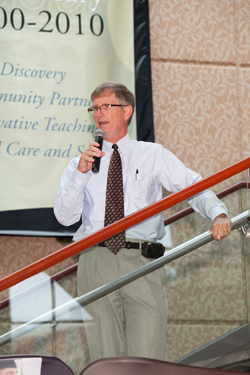
Preparing for
this milestone took nearly two years of thoughtful self-examination and generated a
mountain of paperwork for the LCME to examine. In its letter of
accreditation, the LCME praised the College of Medicine’s unswerving
dedication to its mission; its pipeline for recruiting a diversity of
medical students; its community faculty apprenticeship model; its strong
faculty development program; and its high faculty retention rate.
“Our graduation and match statistics, our strong board scores and student
performance with our community model, and the impacts we are having across
the state have validated that this model is working and working very well,”
said Dean John P. Fogarty (pictured here at a
reaccreditation celebration in the atrium). “We appreciated having an
opportunity to share examples of that success with our LCME site visitors.”
Only LCME-accredited institutions may receive federal
grants for medical education and participate in federal loan programs. And
U.S. M.D. students must have graduated from an LCME-accredited program
before they can take the U.S. Medical Licensing Exam or enter approved
residency programs.
Read more about what the LCME said in its report.
ACCREDITATION CONGRATULATIONS, PART 2
Two days after
the LCME celebration came a message from the ACGME (Accreditation Council
for Graduate Medical Education), which accredits residency programs and
their institutional sponsors. It has granted continued accreditation to the College of Medicine.
That vote of confidence means the medical school can continue to be a
sponsoring institution for residency programs, the next step for medical
students after their M.D. degree. The College of Medicine has two such
programs at Sacred Heart Hospital in Pensacola: one in pediatrics and one in
obstetrics-gynecology. It also is launching an internal medicine residency
program with Tallahassee Memorial Hospital and a family medicine one with
Lee Memorial Hospital in Fort Myers. (See next story.)
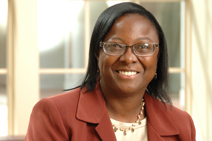
“As the first new medical school of the 21st century, it’s very
meaningful to have outside validation of the successful outcomes our program
is producing,” said Alma Littles (pictured here),
senior associate dean for medical education and academic affairs.
“We are working hard to prepare our students to be successful in their
graduate medical education following the completion of medical school. We’ve
seen this hard work paying off in the feedback we get from residency program
directors about the quality of our graduates, including the high percentage
of our graduates who are awarded chief resident status. With this
seal of approval from the ACGME, we have a clear statement that we also will
be there to help provide excellent training opportunities beyond medical
school.”
SPEAKING OF RESIDENCY … A BRAND-NEW PROGRAM
At a time when Florida desperately needs more residency programs to
accommodate its growing number of medical school graduates, the recent news
from Southwest Florida was especially encouraging: a new family medicine residency
program in Fort Myers.
The program will be based at Lee Memorial
Hospital with the College of Medicine as its institutional sponsor. It could
begin taking applications from prospective residents as early as 2012 and
admit its first class in July 2013.
“Even though the number of our
graduates to complete residency training at this point is relatively small,
there is evidence that when they train in Florida it keeps them in Florida,
especially in the communities where their training takes place,” said
Alma Littles, M.D., senior associate dean for medical
education and academic affairs. In fact, 90 percent of FSU College of
Medicine graduates who completed residency in Florida are now practicing in
Florida.
Read more about this
new residency program.
HURT
HONORED FOR RESEARCH LEADERSHIP
Senior Associate Dean
Myra Hurt has received the Jim King Leadership Award for her
numerous contributions to education, science and research in Florida.
The annual award, presented by Florida’s Center for Universal Research
to Eradicate Disease (FL CURED), recognizes outstanding efforts to expand
and enhance Florida’s biomedical research enterprise and expedite cures.
Hurt is the 2011 co-recipient, along with William Dalton, president and CEO
of Moffitt Cancer Center.
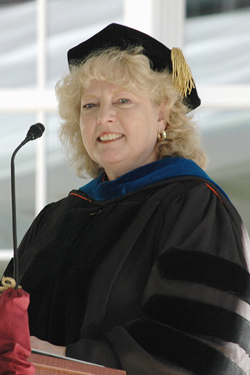
The award is named after the late Florida Sen. Jim King, who sponsored
legislation leading to creation of the Florida Biomedical Research Program.
Hurt, Ph.D., professor of biomedical sciences and senior associate dean
for research and graduate programs, is widely regarded as the founding
mother of the College of Medicine. Along the way, she also
helped the U.S. realize it was facing a shortage of both physicians and
medical schools. Since 2006 she has served on the advisory council that
rates and recommends biomedical research projects for funding in Florida.
“I think it’s really gratifying to win this award that bears Jim King’s
name because his legacy is, among other things, the biomedical research
program his legislation created,” Hurt said. “We’ve certainly seen a
challenging and difficult funding environment in Florida, where biomedical
research plays a vital role in the health of our citizens and in driving our
economy.”
College of Medicine Dean John P. Fogarty
said: “Dr. Hurt’s vision, leadership and lifetime commitment to medical
education and research in Florida are exemplary.”
Read a
longer version of this story.
PATIENT-SAFETY GRANT NEARLY $1 MILLION
Assistant Professor
Dennis Tsilimingras is studying patient safety with a
two-year, $908,000 grant from the federal Agency for Healthcare Research and
Quality. With the participation of the Tallahassee Memorial Hospitalist
Group, the study will monitor approximately 600
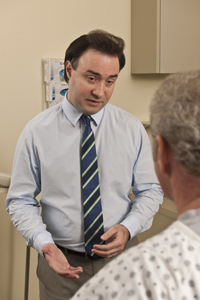 hospital
patients for three weeks after they’re discharged and document any medical
problems they encounter. hospital
patients for three weeks after they’re discharged and document any medical
problems they encounter.
Tsilimingras (pronounced “chili-MING-gras”),
director of the medical school’s Center on Patient Safety, and his fellow
researchers will be looking for medical errors that injure patients. In the
language of patient safety, those are called “post-discharge adverse
events.”
He said the only previous U.S. study done, in Boston, found
that 19 percent of discharged patients experienced an adverse event. When
that study was replicated in Ottawa, the rate was 23 percent. He said those
were five to six times higher than in-hospital rates. Neither study looked
at rural patients, whereas half of the patients in Tsilimingras’ study will
be rural.
Read more about
this grant and patient safety.
LIFELONG LEARNERS GET GLIMPSE OF MEDICINE
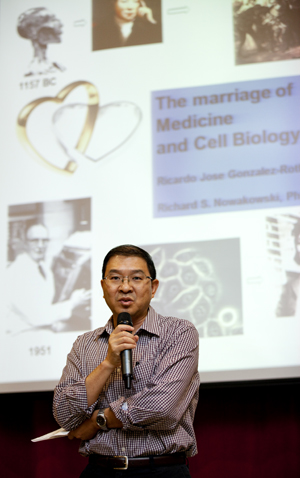 What
if we got our teachers out of the classroom, our researchers out of the lab,
and shared them with the community? What if they used everyday language to
provide valuable insights from different perspectives? What
if we got our teachers out of the classroom, our researchers out of the lab,
and shared them with the community? What if they used everyday language to
provide valuable insights from different perspectives?
It’s a great
idea, and it’s playing out right now in a six-week series called “In
Sickness and in Health: The Marriage of Cell Biology and Medicine.” The plan
was hatched by Associate Professor Yanchang Wang
(pictured here), Grants Liaison Kerry Maddox and
Department Chairs Richard Nowakowski
(Biomedical Sciences) and Ricardo Gonzalez-Rothi (Clinical
Sciences).
The series is part of Florida State’s Osher Lifelong
Learning Institute and is taking place in the Maguire Center at Westminster
Oaks retirement complex. Each session is team-taught by one clinician and
one researcher. In addition to Gonzalez-Rothi, Nowakowski and Wang, the
College of Medicine faculty members taking part are Professor
Pradeep Bhide, M.D., Associate Professor John Blackmon,
M.D., Dean John Fogarty, M.D., Associate Professor
James Olcese, Ph.D., Professor Charlie Ouimet,
Ph.D., Professor Mike Overton, Ph.D., Professor Ed
Valenstein, M.D., and Associate Professor (and clinical
psychologist) Elena Reyes, Ph.D. (The
other OLLI lecturer, neurologist George Slade, is not on the medical school
faculty.)
The lectures will be posted on the
College of Medicine website.
THE DIVERSE ROAD TO EXCELLENCE
The days of
seeing diversity as a problem to be solved are behind us, Marc Nivet,
chief diversity officer of the Association of American Medical Colleges,
told a College of Medicine audience Oct. 12. Nor is diversity the goal in
itself. Instead, it’s a force to be harnessed in the quest for excellence.
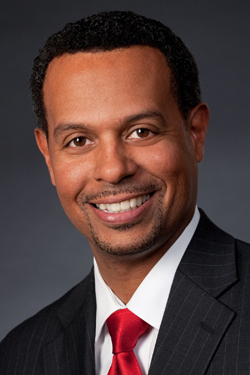 “If
we changed every face in medicine tomorrow and all of a sudden every medical
student across the country had a brown face, but we had the same health
outcomes we have today across this country, who really cares?” Nivet
(pronounced ni-VAY) told the auditorium crowd. The real goal, he said,
is excellence in providing better health care for everyone. “If
we changed every face in medicine tomorrow and all of a sudden every medical
student across the country had a brown face, but we had the same health
outcomes we have today across this country, who really cares?” Nivet
(pronounced ni-VAY) told the auditorium crowd. The real goal, he said,
is excellence in providing better health care for everyone.
“Diversity is a driver of excellence,” he said. “In fact, it accelerates the
pace to excellence.”
Nivet (pictured here) defined
“diversity” as simply our differences, and he defined “inclusion” as a
culture in which we all thrive, no matter what our differences are. His
visit coincided with the recent formation of the College of Medicine’s
Diversity and Inclusion Council, co-chaired by Associate Professor
Jon Appelbaum, M.D., and Assistant Dean Helen Livingston,
Ed.D.
“Dr. Nivet’s presentation and subsequent discussions and
meetings prompted a lot of discussion about our concerns and the diversity
and inclusion issues we should address,” Livingston said. “He provided a
thoughtful analysis in his advocacy to bring diversity and inclusion into
the mainstream discussion and beyond just a campaign to increase numbers.”
Appelbaum noted that Nivet was particularly impressed with the breadth
and depth of the college’s pipeline programs.
“I learned a tremendous
amount and am so appreciative of the fact that such good work is occurring,”
Nivet wrote after his visit. “It is clear FSU Med is a special place.”
TRANSLATIONAL LAB OPEN HOUSE
As many as 150 visitors, many from
the other science centers at Florida State, came to tour the Translational
Science Laboratory on Aug. 25. “Our hope is that the lab will help build
interdisciplinary research in the college, across the university and
elsewhere,” said Myra Hurt, Ph.D., senior associate dean
for research and graduate programs. “There are exciting research
opportunities ahead for all of us.”
Find out exactly which
cutting-edge devices are in the lab.
COLLEGE CO-HOSTS DIABETES CONFERENCE
Florida’s surgeon
general and experts from the College of Medicine and elsewhere participated
in an all-day diabetes conference Sept. 23 at FSU’s Turnbull Center.
“Diabetes Prevention and Management: Reaching Diverse and Underserved
Populations” was sponsored by the state Health Department’s Diabetes
Prevention and Control Program and co-hosted by the College of Medicine and
Tallahassee Memorial Hospital’s Diabetes Center.
Among the presenters
from the medical school were Professor Gail Bellamy, Ph.D.,
director of the Center for Rural Health Research and Policy, on health
literacy; Professor Ken Brummel-Smith,
M.D., chair of the Department of Geriatrics, on older patients; and
Associate Professor José E. Rodríguez, M.D., on cultural
considerations. The conference was designed for physicians, nurses, nurse
practitioners and other health-care providers.
ARTS AND
HEALTH IN IMMOKALEE
The College of Medicine’s Health Education
Site in Immokalee has been selected for the Arts in Healthcare for Rural
Communities initiative. It will manage the approximately $12,000 that will
be awarded for Immokalee community agencies to help address health
disparities through engagement in the arts.
The University of
Florida Center for Arts and Healthcare visited in September to initiate
conversations about including Immokalee in the project, funded by the Kresge
Foundation. Clinical Assistant Professor Javier Rosado,
Ph.D., said programs in other communities have included weekly
community-based programs such as drawing, ceramics, improvisational theater
and Zumba, as well as artists working with individual patients and
caregivers in settings such as hospitals, clinics and senior centers.
|







 hospital
patients for three weeks after they’re discharged and document any medical
problems they encounter.
hospital
patients for three weeks after they’re discharged and document any medical
problems they encounter.  “If
we changed every face in medicine tomorrow and all of a sudden every medical
student across the country had a brown face, but we had the same health
outcomes we have today across this country, who really cares?” Nivet
(pronounced ni-VAY) told the auditorium crowd. The real goal, he said,
is excellence in providing better health care for everyone.
“If
we changed every face in medicine tomorrow and all of a sudden every medical
student across the country had a brown face, but we had the same health
outcomes we have today across this country, who really cares?” Nivet
(pronounced ni-VAY) told the auditorium crowd. The real goal, he said,
is excellence in providing better health care for everyone. 